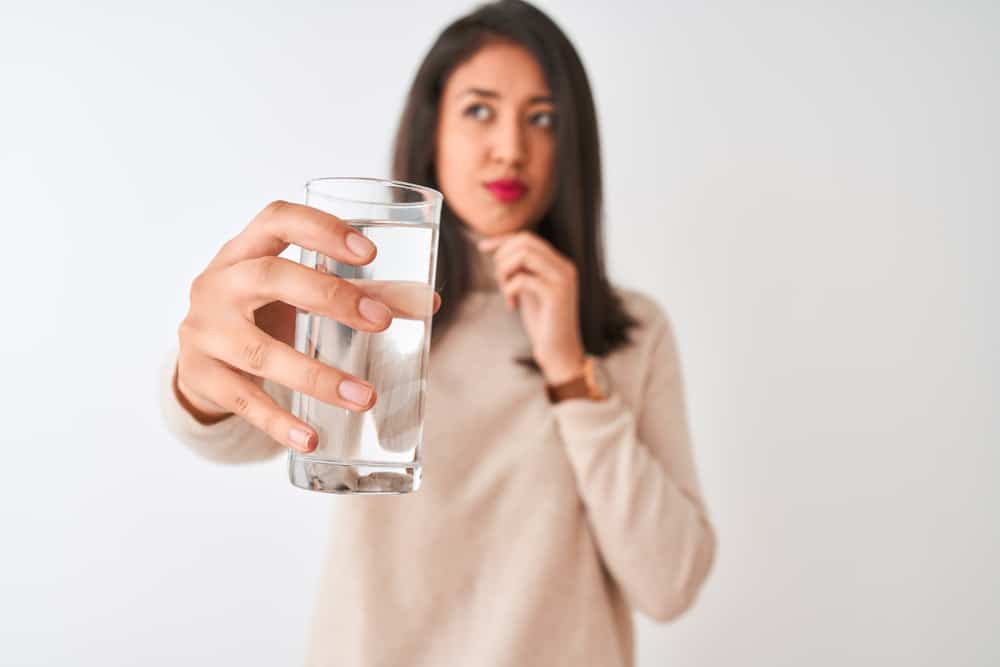Is It OK to Drink Distilled Water?
Yes, it is safe to drink distilled water. However, experts recommend that people should not regularly drink distilled water. The exception? If water contaminated with harmful substances like lead is the only other option available.
What is Distilled Water?
Distilled water is a specific type of purified water. It first begins with boiling water into a vapor (steam). Then, the vapor condenses into a liquid form in another container. The result is water that does not contain minerals (like calcium, magnesium, and phosphorus) and dangerous contaminants like heavy metals (such as arsenic, lead, and mercury).
Is Purified Water the Same as Distilled Water?
Distilled water is a type of purified water, but not all purified water is distilled water. Other popular ways to purify water besides distillation include:
Carbon Filtering
This process is quite simple; water pushes through a layer of activated carbon (aka, activated charcoal). Since activated carbon has a large, porous surface area, it can catch many unwanted particles. This method is popular as it can improve the taste and odor of the water. However, this method will not effectively remove the likes of hard minerals or microorganisms like bacteria.
Deionization
This chemical process removes mineral ions (an atom or other molecule with a positive or negative charge) from water. The result is purer water, although this water may still contain:
- Uncharged atoms or molecules, since deionization only affects charged substances
- Microorganisms like bacteria, since basic deionization does not kill these microorganisms with heat (as is the case with distillation) or other chemicals
Reverse Osmosis
This purification process pushes water through a partially permeable, or semipermeable, membrane. This membrane catches lots of unwanted contaminants, leaving behind cleaner, purer water.
Is Boiling Water the Same as Distilled Water?
Not quite.
Boiling is the first step in the distillation process. Distillation, however, takes this process one step further. Namely, steam has to condense back into a liquid form in a new, clean container. Boiled water can kill microorganisms, but it won’t necessarily eliminate other contaminants and minerals the way full distillation will.
The Good, the Bad, and the Ugly Side Effects of Drinking Distilled Water
Distilled water has its uses, but it won’t be the perfect fit for everyone. So, just what should people know when deciding if this kind of water is right for them?
The Good
Experts say that it is safer to drink distilled water than contaminated water. For example, in an area where dangerous lead contamination is an issue, it’s a much better idea to stick to distilled water than the lead-laden alternative.
The Bad
Many people note that distilled water has an “odd” taste. This taste is due to the removal of minerals and the like; these minerals add a distinct flavor to water many people prefer.
Removal of minerals doesn’t just mean a bad taste, though. One such mineral that’s added to lots of water is fluoride, which helps protect the teeth. Evidence shows that removing fluoride from drinking water increases the risk of tooth decay. Therefore, replacing fluoride-treated water with distilled water may increase the odds of dental problems.
The Ugly Potential Side Effects
Fluoride isn’t the only potential mineral distillation removes from water either; distillation also strips water of both calcium and magnesium. These two minerals are crucial for maintaining good health. So, in people who are already calcium and/or magnesium deficient, distilled or otherwise demineralized water may not be the best choice.
That being said, most people’s primary source of these essential elements is not potable water. Distilled water will likely not cause calcium and/or magnesium deficits for those who aren’t at risk for these deficiencies.
Why Do People Use Distilled Water?
Even if it’s not the best choice for drinking, distilled water is still useful for several applications, including the following:
- Laboratory experiments
- CPAP machines
- Watering indoor plants
- Neti pot to relieve sinus pressure
Final Thoughts
At the end of the day, people can drink some distilled water and be perfectly fine. In places where there is questionable water, distilled water is clearly the safer option. After all, the distillation process eliminates nearly all impurities, including viruses and bacteria.
However, replacing all drinking water with distilled water does present certain risks. For example, distilled water contains no fluoride. And drinking fluoride-less water may increase the odds of tooth decay. Furthermore, those who at risk of calcium or magnesium deficiencies might benefit more from other sources of water.








